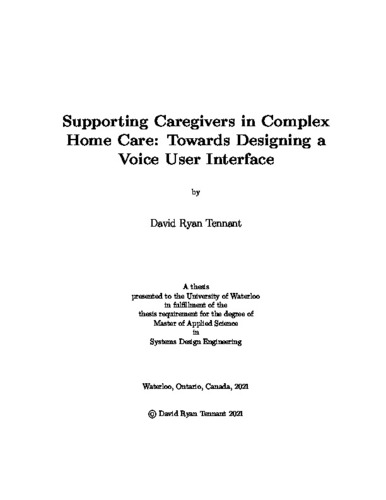| dc.contributor.author | Tennant, Ryan | |
| dc.date.accessioned | 2021-05-10 20:10:27 (GMT) | |
| dc.date.available | 2021-05-10 20:10:27 (GMT) | |
| dc.date.issued | 2021-05-10 | |
| dc.date.submitted | 2021-05-07 | |
| dc.identifier.uri | http://hdl.handle.net/10012/16963 | |
| dc.description.abstract | Despite significant advancements in the development of digital health tools and the rising provision of health care services in the home, information management and communication has yet to be standardized through digitization across caregiver teams in complex home care. With the increased risks of adverse events in dynamic and unpredictable home environments, there is a critical need to improve care inconsistencies and prevent communication breakdowns. An opportunity exists for digital health tools to support the standardization of information sharing processes in the home. However, designing digital tools to support complex home care is challenging when considering the uniqueness of patient conditions, the home environment, and caregiving team diversity. Adopting digital health tools in unregulated environments also induces a challenge for standardizing digitization in this complex domain. With advancements in natural language processing and speech recognition, the development of digital health interfaces that provide a natural interaction with information by voice has shown promise to support information management and communication and facilitate engagement with home care technology.
The objective of this research is to build a foundation for the future development of a voice user interface or Voice Assistant (VA) to support caregivers in complex home care. The objectives are two-fold: (1) to understand the diverse caregiving experiences related to health information management and communication in complex home care and (2) evaluate the diverse perspectives of caregivers on the design of a VA to support these identified processes. Using a mixed-methods approach of semi-structured interviews and questionnaires with 22 caregivers across North America, this research contributes to understanding both the information and communication processes as well as the design considerations for integrating VA technology in complex home care by potential primary users.
This thesis consists of three papers that describe the partial results of one study. One paper focuses on the semi-structured interviews with family caregivers of Children With Special Health Care Needs (CSHCN) to understand the processes involved with managing care in their home. The second paper focuses on the semi-structured interviews with family caregivers and hired caregivers of older adults in the same context. The third paper focuses on the semi-structured interviews and questionnaires with all participants about their expectations for the design of VAs in complex home care.
This thesis captures the rich experiences of caregivers who are managing the coordination of care in complex home environments and the considerations for designing VA technology in this domain. The principal findings highlight similarities in caregiving processes and the nuanced complexities among caregiver populations that can inform the design and usability considerations of future digital health tools. There is also the potential for VA technology to provide utility for health information management and communication. However, considerations for functionality and the context of use may impact this innovation's diffusion. Future research should collectively examine home care from caregiving teams' perspectives and objectively measure human-information interaction with this technology in context-specific scenarios. | en |
| dc.language.iso | en | en |
| dc.publisher | University of Waterloo | en |
| dc.subject | home care | en |
| dc.subject | digital health | en |
| dc.subject | children | en |
| dc.subject | older adult | en |
| dc.subject | caregiver | en |
| dc.subject | human factors | en |
| dc.subject | voice assistant | en |
| dc.subject | technology acceptance | en |
| dc.title | Supporting Caregivers in Complex Home Care: Towards Designing a Voice User Interface | en |
| dc.type | Master Thesis | en |
| dc.pending | false | |
| uws-etd.degree.department | Systems Design Engineering | en |
| uws-etd.degree.discipline | System Design Engineering | en |
| uws-etd.degree.grantor | University of Waterloo | en |
| uws-etd.degree | Master of Applied Science | en |
| uws-etd.embargo.terms | 0 | en |
| uws.contributor.advisor | Burns, Catherine | |
| uws.contributor.advisor | Mercer, Kate | |
| uws.contributor.affiliation1 | Faculty of Engineering | en |
| uws.published.city | Waterloo | en |
| uws.published.country | Canada | en |
| uws.published.province | Ontario | en |
| uws.typeOfResource | Text | en |
| uws.peerReviewStatus | Unreviewed | en |
| uws.scholarLevel | Graduate | en |

